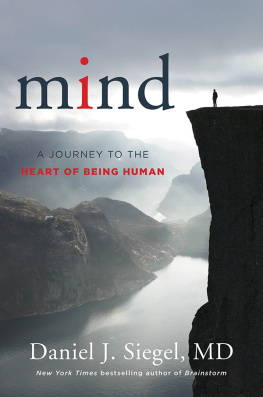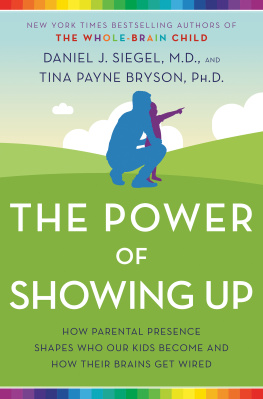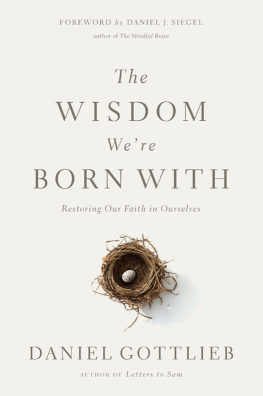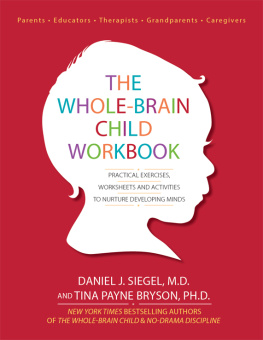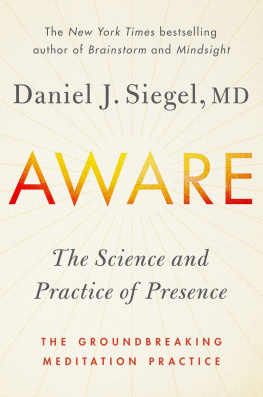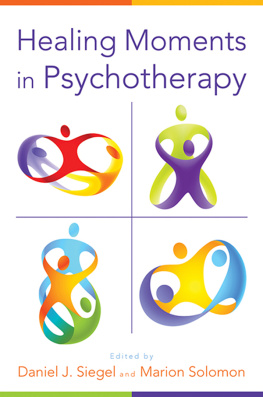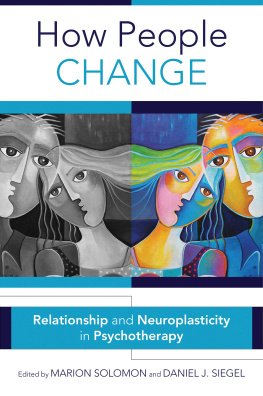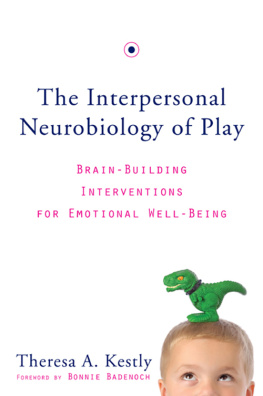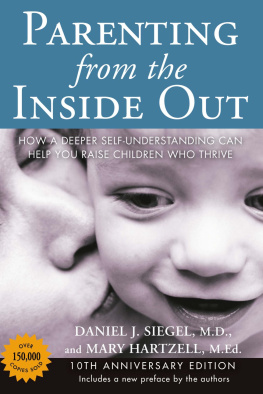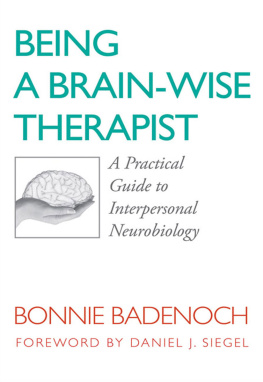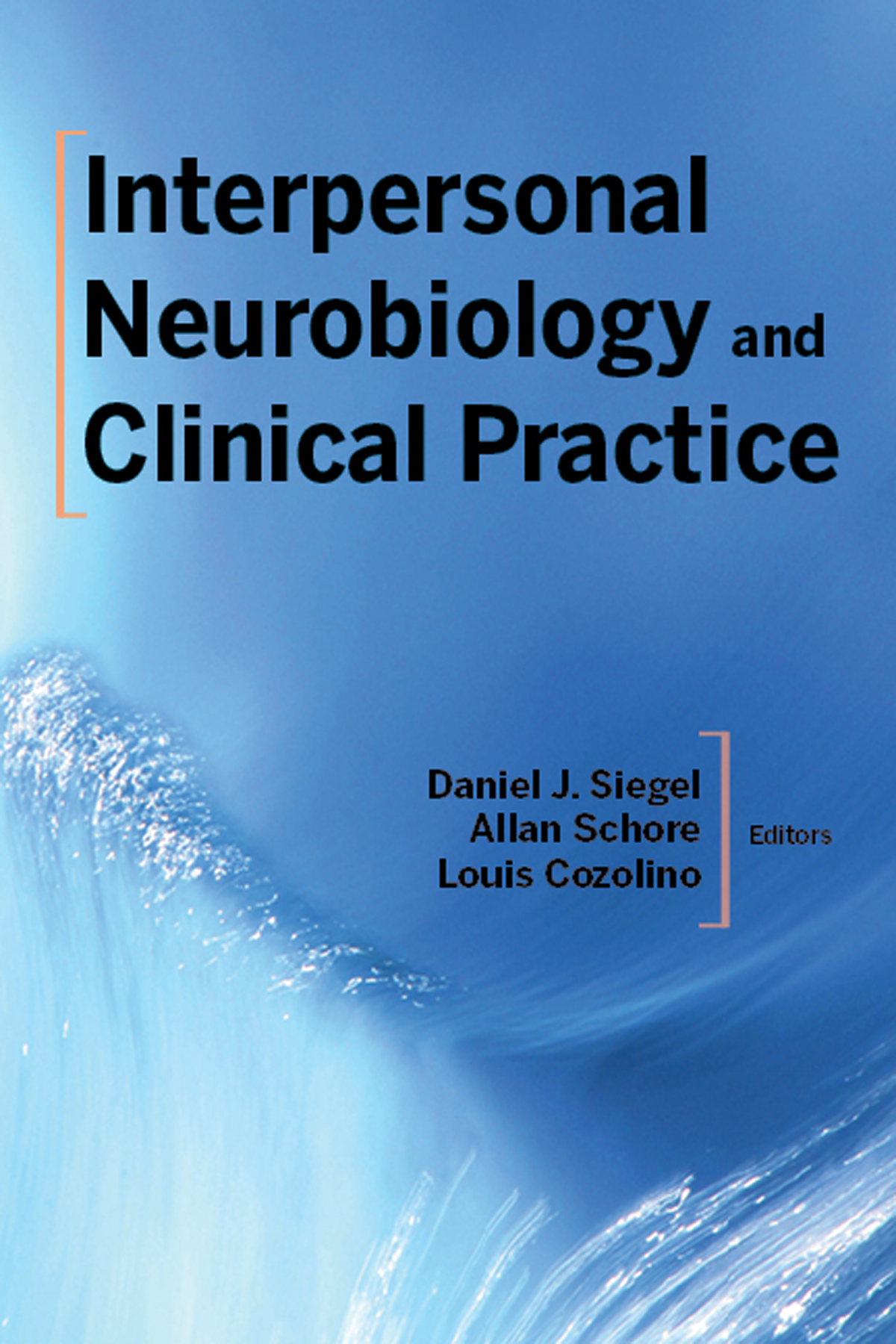Contents
Guide
Page List
The Norton Series on Interpersonal Neurobiology
Louis Cozolino, PhD, Series Editor
Allan N. Schore, PhD, Series Editor, 20072014
Daniel J. Siegel, MD, Founding Editor
The field of mental health is in a tremendously exciting period of growth and conceptual reorganization. Independent findings from a variety of scientific endeavors are converging in an interdisciplinary view of the mind and mental well-being. An interpersonal neurobiology of human development enables us to understand that the structure and function of the mind and brain are shaped by experiences, especially those involving emotional relationships.
The Norton Series on Interpersonal Neurobiology provides cutting-edge, multidisciplinary views that further our understanding of the complex neurobiology of the human mind. By drawing on a wide range of traditionally independent fields of researchsuch as neurobiology, genetics, memory, attachment, complex systems, anthropology, and evolutionary psychologythese texts offer mental health professionals a review and synthesis of scientific findings often inaccessible to clinicians. The books advance our understanding of human experience by finding the unity of knowledge, or consilience, that emerges with the translation of findings from numerous domains of study into a common language and conceptual framework. The series integrates the best of modern science with the healing art of psychotherapy.
A Norton Professional Book
Interpersonal Neurobiology and Clinical Practice
edited by Daniel J. Siegel, Allan N. Schore, and Louis Cozolino

Contents
Daniel J. Siegel, M.D., is a clinical professor of psychiatry at the UCLA School of Medicine and the founding co-director of the Mindful Awareness Research Center at UCLA. He is also the Executive Director of the Mindsight Institute which focuses on the development of mindsight, and teaches insight, empathy, and integration in individuals, families, and communities. Dr. Siegel has published extensively for both the professional and lay audiences. His five New York Times bestsellers are: Aware: The Science and Practice of Presence, Mind: A Journey to the Heart of Being Human, Brainstorm: The Power and Purpose of the Teenage Brain, and two books with Tina Payne Bryson, Ph.D.: The Whole-Brain Child, and No-Drama Discipline. His other books include: The Developing Mind, The Pocket Guide to Interpersonal Neurobiology, Mindsight, The Mindful Brain, and The Mindful Therapist. He has also written The Yes Brain and The Power of Showing Up with Tina Payne Bryson, Ph.D. Dr. Siegel also serves as the Founding Editor for the Norton Professional Series on Interpersonal Neurobiology which currently contains over seventy textbooks. For more information about his educational programs and resources, please visit: www.DrDanSiegel.com and www.mindsightinstitute.com.
Allan N. Schore, Ph.D., is on the clinical faculty of the Department of Psychiatry and Biobehavioral Sciences, UCLA School of Medicine. He is the author of six seminal volumes, including Affect Regulation and the Origin of the Self (Classic Edition), and two recently published books, Right Brain Psychotherapy and The Development of the Unconscious Mind, as well as numerous peer reviewed articles and chapters. His contributions appear in multiple disciplines, including neuroscience, psychotherapy, psychoanalysis, psychiatry, developmental psychology, infant mental health, attachment theory, trauma studies, behavioral biology, clinical psychology, and clinical social work. He is the past editor of the Norton Series on Interpersonal Neurobiology, and has received a number of honors for his work, including an Award for Outstanding Contributions to Practice in Trauma Psychology from the Division of Trauma Psychology, the Scientific Award from the Division of Psychoanalysis of the American Psychological Association, Honorary Membership by the American Psychoanalytic Association, and the Reiss-Davis Child Study Center Award for outstanding contributions to Child and Adolescent Mental Health. He has extensively lectured internationally, and has had a private psychotherapy practice for more than four decades.
Louis Cozolino, Ph.D, has diverse clinical and research interests and holds degrees in philosophy, theology, and clinical psychology. His primary interests are in the areas of the synthesis of neuroscience with psychotherapy, education, management, and executive functioning. He is the author of ten books including The Neuroscience of Psychotherapy, The Neuroscience of Human Relationships, Attachment-Based Teaching, The Making of a Therapist, and Why Therapy Works. He has also authored and co-authored articles and book chapters on child abuse, schizophrenia, education, language, and cognition. Dr. Cozolino lectures around the world on brain development, evolution, and psychotherapy and maintains a clinical and consulting practice in Los Angeles and New York.
Carly Samuelson is a writer for Cozolino & Co. who specializes in Interpersonal Neurobiology. She attended graduate school at Pepperdine University, where she earned a Master of Arts degree in Psychology and began her work with Dr. Lou Cozolino. Prior to continuing her education, Carly studied journalism and worked as a writer and producer of television.
Chloe Drulis is a writer for Cozolino & Co. and a Masters student in Clinical Psychology at Pepperdine University. She is trained in play-based therapeutic intervention and began her career working with children at Therapeutic Play LA in Los Angeles. This inspired her future academic pursuits on the subject of Interpersonal Neurobiology, including her work with Dr. Lou Cozolino.
Stephen W. Porges, Ph.D., is Distinguished University Scientist at Indiana University where he is the founding director of the Traumatic Stress Research Consortium in the Kinsey Institute. He is Professor of Psychiatry at the University of North Carolina, and Professor Emeritus at both the University of Illinois at Chicago and the University of Maryland. He served as president of the Society for Psychophysiological Research and the Federation of Associations in Behavioral & Brain Sciences. He is the originator of Polyvagal Theory, a theory that emphasizes the importance of physiological state in the expression of behavioral and mental health problems.
Kathy Steele, MN, CS, is in private practice in Atlanta, Georgia and is an Adjunct Faculty at Emory University. Kathy is a Fellow and a past President of the International Society for the Study of Trauma and Dissociation (ISSTD), and is the recipient of a number of awards for her clinical and published works, including the 2010 Lifetime Achievement Award from ISSTD. She has (co)authored numerous publications in the field of trauma and dissociation, including three books, and lectures internationally on topics related to trauma, dissociation, attachment, and therapeutic resistance and impasses.
Bonnie Badenoch, Ph.D., LMFT, is a mentor, teacher, and author who delights in integrating the discoveries of interpersonal neurobiology and relational neuroscience into the art of therapy. She helps others cultivate their capacity for true presence as the foundation of healing, both in the counseling room and in daily life. Her home is in the Pacific Northwest where she writes, gardens, hikes, and relishes time with her wife, family, and friends. She is the author of
Next page

